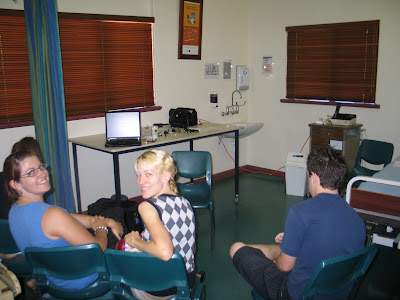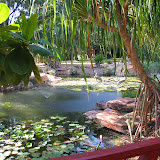Sunday, May 06, 2007
FARTs

Last week we spent in Broome, for the annual Formative Assessment in Rural Training, or FARTS as Professor Campbell likes to call them. This being "tourist season" in Broome, kind of like winter in Florida, accomodation was hard to come by, so the Rural Clinical School ended up putting us into the pricey Cable Beach Club Resort, across the road from Cable Beach.
Cable Beach is rated the #2 beach in all of Australia, the continent with the best beaches on the planet. (#1 is Esperance according to the poll, but its rather cold there now in late autumn.) There are 10 meter tides, which means at low tide, I had to walk about 1/4 mile over the wet surface from the dunes to the water's edge. This was great as the fine sand was patterned with wonderful radial geometries made by 1 inch long crabs, interspersed with long random snail trails laid down by tiny welks. The turquoise Indian ocean was very warm and seemed much saltier than the Gulf in Florida. It was rather a shock to stay at this resort for 4 nights after living so long in dusty, mudflatted Derby. We also felt a bit guilty about the cost, when we are surrounded, both in Broome and Derby by those who have so much less. A conscience is a terrible thing.
The 4 days included two exam days, and two workshop days. My students were pooled with the 8 students from Broome, and the 7 from Karratha and Port Hedland, for a total of 18. Monday was devoted to OSCE's, or "Observed Structured Clinical Examinations". We faculty ran 6 stations, and each student had to complete them all. Each station was 15 minutes, and the student comes to the door of the room, reads a short precis, and then has to perform the task. Half of the stations had an actor, and the student is instructed to do a brief interview, and demonstrate a skill. For example, the student interviews a patient with fatigue, tiredness and 10 pound weight gain, then must explain the possible diagnoses, outline a plan to investigate, and interpret the thyroid tests given at the end. This type of exam tests skills that students will need in everyday office practice. My case was of a young pregnant woman, who (18 times) asked the "doctor" to explain what they "were feeling for when you push on my tummy, how will I know when something is wrong, when should I go to the hospital?" Listening to this 18 times makes for a long day.
Tuesday the students had a day long Paeds workshop, and we had a local Medical Coordinators meeting, debriefing from Monday, and putting finishing touches on our Wednesday workshops. Vicki and I took a beach walk north up to the "nudie beach" in the morning, and on the way back, crossing some rocks, I slipped and caught my ankle in a crack and fell hard, right on my face. It was fast and frightening, and I ended with a couple of gashes in my shins, but otherwise no major damage except to my dignity. (My daughter Liz when told about it summarized it in engineering terms as "high center of gravity + gawky = fall"). Tuesday evening the students and faculty all went out to dinner together.
 The next day we ran 9 stations in rotation for "quick clinical workshops". I ran a double station, teaching pneumatic otoscopy and how to use the tympanometer. These are crucial skills in the Kimberly, where ear disease among children is rampant. (I have never seen so many draining ears from infected, perforated eardrums in such a short time in my entire career.) Other stations included knee and shoulder exams, some patients with heart murmurs, and a case of pediatric trauma. (Our dummy child got her foot bitten off by a crocodile before it drowned her- the students eventually learn to look under the bandage once they stabilize her.) These are great fun, and we mixed the students from different sites together to make it more interesting for them.
The next day we ran 9 stations in rotation for "quick clinical workshops". I ran a double station, teaching pneumatic otoscopy and how to use the tympanometer. These are crucial skills in the Kimberly, where ear disease among children is rampant. (I have never seen so many draining ears from infected, perforated eardrums in such a short time in my entire career.) Other stations included knee and shoulder exams, some patients with heart murmurs, and a case of pediatric trauma. (Our dummy child got her foot bitten off by a crocodile before it drowned her- the students eventually learn to look under the bandage once they stabilize her.) These are great fun, and we mixed the students from different sites together to make it more interesting for them.Thursday was the Long Case. This is an hour long exam where the student is asked to do a complete history and focused clinical exam on a real patient, while I watch and score. Each of us had 4 patients, which again makes for a long morning. We only let the patients be interviewed by 2 students, or they become stale and bored with their own stories. One of my patients had rheumatic heart disease, and the other had obvious lung disease, with a few twists. I found it interesting to see the variation in skill which each student had in approaching the patients. And at the end of both Long Cases and OSCEs, we also ask the patients to rate the doctors "bedside manner" and give them that feedback.
We quit Broome immediately after the Long Cases and drove back to Derby. Vicki and I enjoyed Broome and the students. I felt the social support was helpful to combat the isolation of living and working in such remote places. But ultimately were happy to come back home to our friendly, quiet little town.
Click the image below for pictures of the gardens, and also for StoneRage, a shop that imports wonderful art and furniture from Indonesia.
 |
| Broome_May |
